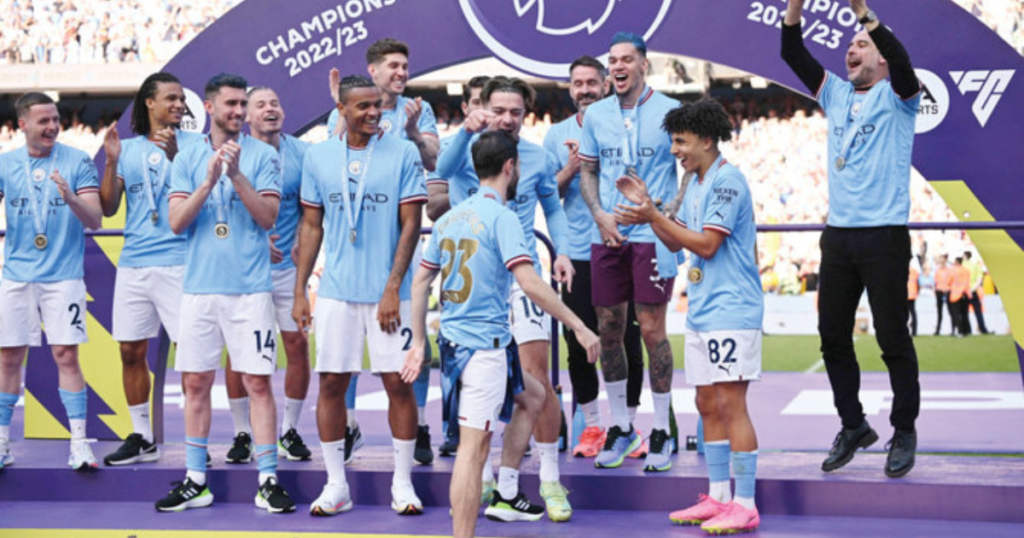The involvement of Abu Dhabi United Group (ADUG) in the Manchester City Corruption Scandal sent shockwaves through the football world. This scandal, centred on allegations of fraud, dishonesty, and the manipulation of financial regulations, revealed a web of deception and false information. Club directors, led by Sheikh Mansour bin Zayed al-Nahyan, the owner of ADUG, were accused of inflating sponsorship deals. Notably with Etisalat, an Emirati telecommunications company, to artificially boost revenue while concealing operating costs.
The scandal even saw the club expelled from the Premier League, facing points deduction and hefty fines. As the saga unfolded, top players like Erling Haaland and Kevin De Bruyne found themselves entangled in the controversy. This dark chapter in European soccer history ultimately led to a showdown at the Court of Arbitration for Sport (CAS). It raised questions about the role of state-backed companies, revenue generation, and the pursuit of English Premier League titles in the face of financial rules and ethical standards.
The Corruption Scandal Unveiled
The Manchester City Corruption Scandal shook the foundations of the football world, bringing to light allegations of fraud, dishonesty, and the deliberate non-disclosure of information. At its heart, the scandal revolved around breaches of the Financial Fair Play (FFP) regulations. A set of financial rules designed by UEFA to ensure the financial sustainability and fair competition among European soccer clubs.
Financial Fair Play and the UEFA Investigation
The UEFA’s investigation into Manchester City’s finances unearthed a web of deceit that implicated ADUG. Yves Leterme, the head of the independent commission appointed to examine the case, played a pivotal role in exposing the wrongdoings. The investigation revealed that the club had falsely inflated sponsorship revenue while hiding operating costs, a strategy aimed at circumventing the FFP regulations.
Sponsorship Deals and State Ownership
One of the key elements of the corruption scandal involved sponsorship deals, particularly those with Etisalat, an Emirati telecommunications company. These deals were allegedly inflated to artificially boost the club’s revenue, thereby complying with FFP requirements. The direct link between these sponsorships and the state-backed companies of Sheikh Mansour, the owner of ADUG, raised suspicions of foul play.
The Role of the Court of Arbitration for Sport (CAS)
As the investigation deepened, Manchester City was initially slapped with a hefty fine and a deduction in points by UEFA. However, the club appealed to the Court of Arbitration for Sport (CAS) a move that would have significant consequences.
The CAS Decision and Stolen Evidence
In a surprising turn of events, CAS overturned UEFA’s decision and cleared Manchester City of the charges. It was alleged that stolen evidence played a role in the verdict, casting a shadow of doubt over the entire process. The decision not only shocked the footballing world but also raised questions about the independence of CAS in handling such cases.
State-Backed Companies and Financial Regulations
The involvement of state-backed companies in the club’s financial affairs further fueled suspicions of wrongdoing. ADUG’s influence over the club’s financial dealings highlighted the blurred lines between private ownership and state involvement, a concern not limited to Manchester City alone.
Manager Remuneration and Profitability
Another aspect that came under scrutiny was manager remuneration. High salaries for top-tier managers like Roberto Mancini, though not illegal, raised eyebrows regarding the club’s commitment to profitability and sustainability rules. It became evident that Manchester City’s pursuit of success often came at the expense of financial prudence.
Conclusion
In conclusion, the involvement of Abu Dhabi United Group (ADUG) in the Manchester City Corruption Scandal raised significant concerns about their adherence to financial regulations. It includes Financial Fair Play (FFP) in the Premier League. Accusations of fraud, dishonesty, and false information regarding sponsorship deals, operating costs, and income in the game led to investigations by Uefa. The Independent Commission, ultimately resulting in a fine and a deduction in points.
The State ownership of the club, sponsorship revenue from companies like Etisalat, and the role of key figures like Sheikh Mansour bin Zayed al-Nahyan added complexity to the case. Despite the controversy, top players like Erling Haaland and Kevin De Bruyne continued to excel. While the club faced expulsion from the Premier League. The Court of Arbitration for Sport (CAS) played a pivotal role, with allegations of stolen evidence further complicating the case.
